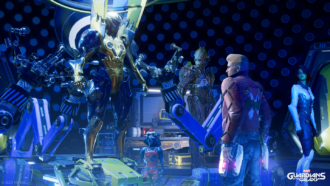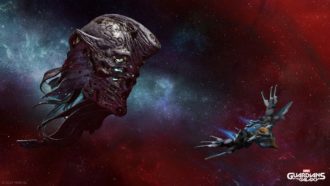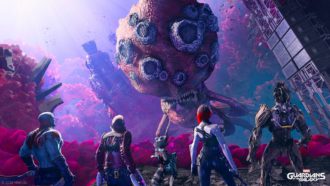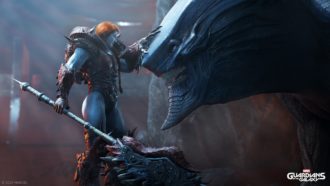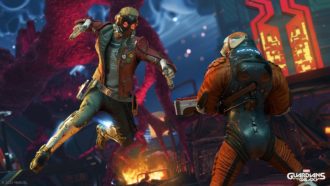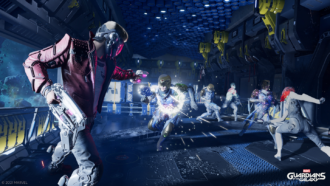Platforms:
Xbox One, PS4, PC, PS5, Xbox Series X|S
Released:
October 26, 2021
Publisher:
Square Enix
Developer:
Eidos Montreal
Guardians of the Galaxy are right up there in the mix when it comes to the best entries into the Marvel Cinematic Universe. The over-the-top superhero action combined with a charming, lovable band of misfits and some of the funniest writing, they debuted almost unknown to the mainstream back in 2014, and have since become a pivotal part of of Marvel’s overarching storytelling. We’ve already seen them appear in videogame form as a narrative Telltale series, but now they’re taking the spotlight in a fully fledged action adventure with all the bells and whistles we’ve come to expect from Eidos-Montréal. While the heart of what makes the group so special has been left intact in this vibrant space-hopping adventure, a curious combat system stops Marvel’s Guardians of the Galaxy from being as epic as it could.
Marvel’s Guardians of the Galaxy features our heroes on a new adventure, featuring our sarcastic hero Peter Quill, known as Star-Lord along with the passionate warrior Gamora, blunt fighter Drax, smartarse tech-whizz Rocket Raccoon and tree-like humanoid Groot. After inadvertently causing a small accident, a series of catastrophic events kick off, threatening the universe unless they jump into action to eradicate the threat. While the whole group gets involved in the chaos, complete with the witty banter that the characters are known for, this does feel very much like Quill’s story, apparent from the opening moments of the experience that have you in his shoes as a 13 year old, interacting with his mother.
As the story goes on, there are scenes that delve deeper into Quill’s psyche, which gives some great context on his personality, his father issues, his love of 80’s music and more. While his arc is the foundation of the game and the one that drives the story forward for the most part with some interesting revelations that were very new to me as a fan of the movies, the other members of the team do get some moments to shine too. One by one, more of their internal struggles are unveiled, some through dialogue while exploring and others with more fully fleshed out cutscenes. Marvel’s Guardians of the Galaxy manages to balance the great sense of humour with some genuinely heartfelt character moments, and I felt like I understood more about each team member and what makes them tick during the games decent running time.
Notably, this is a single-player linear campaign where you only play as Star-Lord, which helps make the story feel more like his than the other Guardians. The team were quick to note that this is not like that poorly-received Marvel team-up game from last year that focused on multiplayer elements. You’re rarely alone though, with the other Guardians acting as team members by your side as you explore, solve puzzles and platforming challenges, and take part in lots of combat, which is where the wheels start to come off a little.
“Marvel’s Guardians of the Galaxy manages to balance the great sense of humour with some genuinely heartfelt character moments…”
As Star-Lord, your basic attacks include his guns and a melee combo, which aren’t exactly very effective. They work in a pinch, and the Gears-esque Rapid Reload gives your guns a damage-boost, but most of your time during combat will be spent directing each of the other Guardians to attack, via a quick-menu that slows down time and has you picking abilities on the fly. Groot can use his roots to hold enemies in place, Drax can pummel them to oblivion, Rocket uses a variety of explosives while Gamora can go in for a dangerous slice-and-dice. It’s fun fighting as a group, but early on it can feel like you’re mostly directing traffic and waiting for cooldown timers so that you can trigger the same abilities over and over.
As you progress through the game, you’ll earn experience in combat that can be used to buy additional abilities for everybody on the team, including Star-Lord, which is where battles start to open up with more possibilities. One allows you to pop up using your rocket boots and get a birds-eye-view of the action, making it easier to direct the team to certain enemies, almost like a real-time tactics scenario. Rocket gains an ability that allows you to pull a group of foes into one area, perfect for Groot to shoot roots up from the ground to impale them, or setting up nicely for Drax to come in with a giant stomp that sends enemies flying. Coming up with cool combos like this and ripping through the battlefield is Marvel’s Guardians of the Galaxy combat at its best, but the constant jumping in-and-out of quick menus disrupts the flow, making it difficult to get into a rhythm a lot of the time.
Once each Guardian learns their abilities, you’ll have to first select the Guardian of choice by pressing L1 and selecting one of the face buttons, and then choose which ability to activate, also mapped to those same face buttons. I got into a habit of just selecting the ability for each Guardian that was my favourite, as it meant less time in these little menus, but the stop-start nature means fights are more arduous and plodding at times than they should be. Star-Lord is also pretty ineffective by himself, and the Guardians basic AI doesn’t trigger abilities on their own, relying on basic attacks too, so you’ll need to be managing their abilities on the fly in every single battle.
Most egregious perhaps is the special “Huddle” ability, which once built up can be activated by hitting the two triggers at once (which, to be honest, I accidentally triggered more times than I intended because of the frantic nature of menu-switching during trickier fights). When activated, everything stops, you switch to first person, and the other Guardians regroup around you. They’ll express a concern or make a statement about the fight, and then you have to take that statement and, between two options, choose the best one to “rally the troops”. It’s useful in that it also revives any downed teammates and then gives a massive buff to everybody on the team if you choose the right response (only Star-Lord gets a buff if you choose the wrong one), but I really wish combat didn’t have to completely stop for this odd interaction, as it really kills the pacing. At least you’re rewarded with a banging 80’s soundtrack which plays while the buff is activated, which is a nice touch.
While we’re talking about music, it’s worth noting that it really is a fantastic track list, featuring iconic 80s rock and pop tunes like Tainted Love, Wake Me Up Before You Go-Go, Take On Me, Never Gonna Give You Up, Call Me, Every 1’s a Winner and many more. It’s fun to shoot and smash through enemies to these tunes, and you can change track selection while wandering around on your ship, the Milano, between missions. There are also a ton of optional conversations that can take place on the Milano between Star-Lord and the rest of the crew, to add even more narrative depth for those looking for it.
Production values are schmick across the board, actually. Character models look and sound great (once you get past the fact they don’t look like Chris Pratt, Batista and others from the films and have different voice actors), and flying from planet to planet often leads to some very unique and strange alien planets, from a strange pulsing exotic landscape with organic platforms to more futuristic cyberpunk style cities full of vendors tended to by odd creatures selling their wares. Every time the Milano doors open up after landing, it’s exciting to see what’s on the other side, just as it’s cool to wander around the Milano itself and explore its various nooks and crannies.
How you navigate these eccentric environments however is relatively linear; the level design keeps you moving from one area to the next on a pretty set path, and curiosity isn’t rewarded in a big way; you’ll mostly be finding component stacks that can be used to buy perks, or maybe a costume, or a trinket that can lead to specific interactions on the ship. I would have loved to spend some more time really exploring these locations in a more open fashion, dabbling in side stuff or at least finding goodies other than two forms of currency, but at least Marvel’s Guardians of the Galaxy does keep you focused on ferrying from one objective to the next.
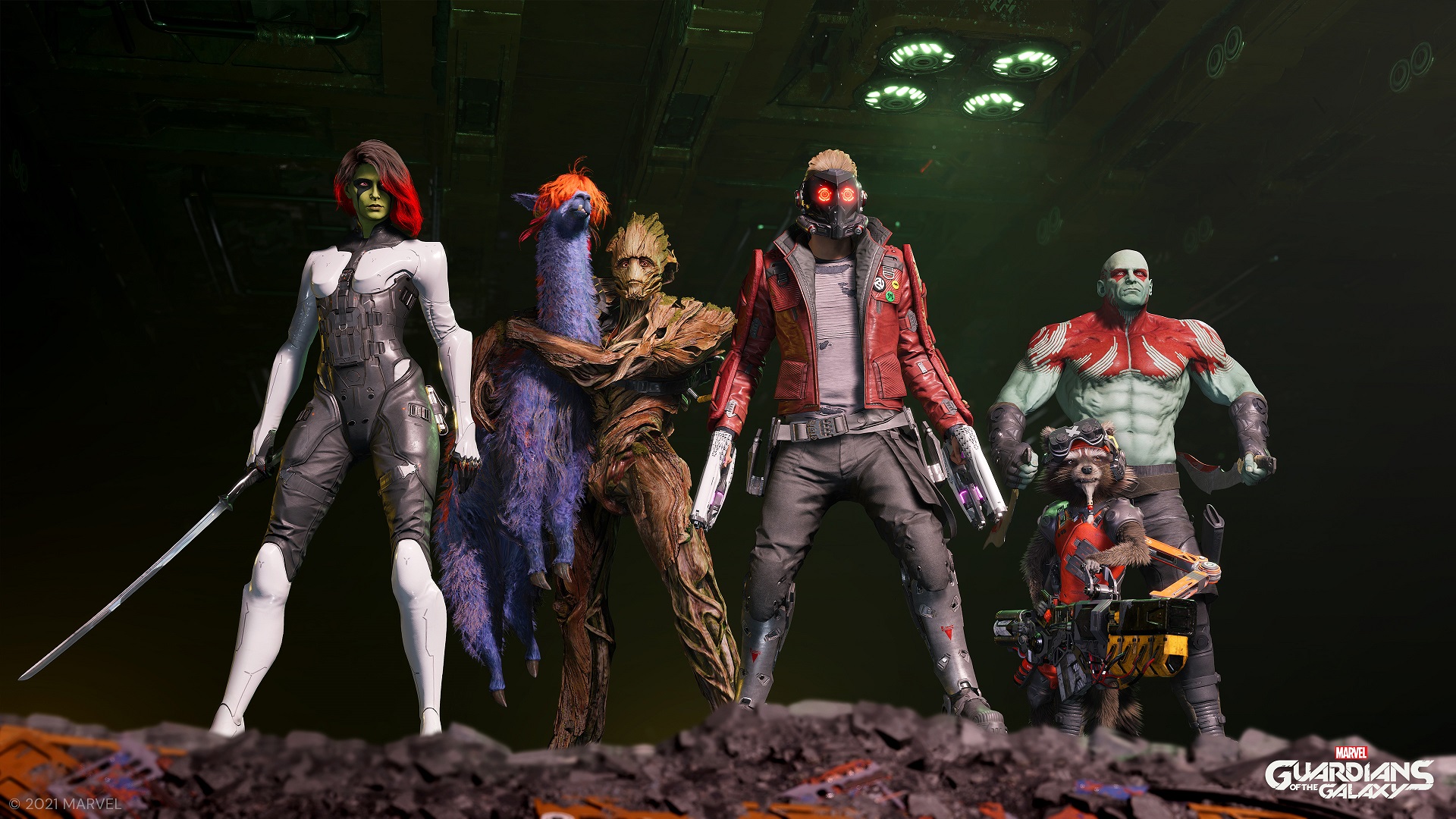
Your teammates are important in making your way through the world, with some light puzzling that has you using their abilities to progress. On a basic level, Drax can smash through walls and Groot can create bridges with his roots. Rocket can hack terminals, while Gamora is able to leap up and anchor herself, so that you can hook yourself up to higher ledges. It’s basic in the sense that only one Guardian is ever good for one job, and if you choose the wrong one they’ll just tell you to ask somebody else, but I still found it fun utilising them in this way outside of combat. Your guns also have additional uses, eventually upgrading to freeze water to create platforms and use fire to melt ice. It’s simple but effective, and clever that the combat abilities doubled as traversal abilities, even though not all the mechanics are particularly inventive.
There’s a lot of decision-based dialogue in the game, with choices that can have an impact on the interactions between the crew and other story beats. Some just prompt a specific line in-the-moment, while other choices prompt a Telltale-style “Rocket appreciated that you had his back” for example, which in theory can lead to separate narrative moments and gameplay assistance later. In one instance, a piece of tech Rocket repaired based on my choices allowed it to help lead us through an environment later as a bit of a homing beacon – presumably, if Rocket hadn’t repaired it, it wouldn’t have been there. Other friendlies you help along the way return the favour. It’s a nice touch. I didn’t get the chance to complete a second playthrough in my time with the game, so the jury’s out on whether the ripple effect would be huge narratively speaking, but I enjoyed making choices I and seeing their impacts come to fruition later.
“…it’s clever that the combat abilities doubled as traversal abilities, even though not all the mechanics are particularly inventive.”
To add to the list of gameplay elements, there are also a couple of flying sections where you’re shooting enemies while in space, but they felt relatively simple and non-threatening, and mostly I just wished I was back on the ground rather than soaring through the galaxy, as it certainly wasn’t as engaging. Other segments have you using terminals to gather information, while your teammates bicker about which option you should choose next, which felt more like I had to choose every option until one triggered the next event, rather than making me feel like I’d accomplished something. The game is also littered with QTEs, some of which left me plummeting to my death on short notice. I’d rather they had just been left out entirely.
Beyond that, Marvel’s Guardians of the Galaxy suffers from a lack of polish at points that causes some frustration. During a boss battle, things froze completely during a Huddle, which led to Gamora, Drax, Rocket and Groot just awkwardly, silently staring at me until I reloaded the checkpoint. Another time, I couldn’t access the abilities menu to use my newly acquired points, and another time I was stuck on the spot, unable to move. A quick reload of a recent save fixed these troubles just fine, but having to replay sections of dialogue or even entire battles because of niggly stuff like this is still pretty frustrating.
7
Good
Positive:
- Likable bunch of misfit superheroes with humorous writing
- Interesting story provides meaningful depth to the cast
- Looks amazing, with unique environments
- Abilities of each of the Guardians are used well in and out of combat
Negative:
- Combat itself can feel muddled with strange pacing
- Level design is quite linear without much room for exploration
- Many ideas, but not all that work effectively
Much like the characters themselves, Marvel’s Guardians of the Galaxy is a really funny mish-mash of ideas and concepts with some working better than others. At its best, the campaign is strong with well-produced cinematic cutscenes, likable characters, gorgeous environments and an action romp that excites when everything is in sync. On the flipside, the pacing of combat stops things from getting into a solid rhythm until later in the game, and I much preferred my time solving puzzles or platforming while enjoying the epic story. When so much of your journey will be spent in combat, that’s a bit of a shame. Despite some quirks, Marvel’s Guardians of the Galaxy is a super-fun superhero adventure that hits more than it misses, with a banging soundtrack and a lot of personality that more than makes up for its shortcomings.
